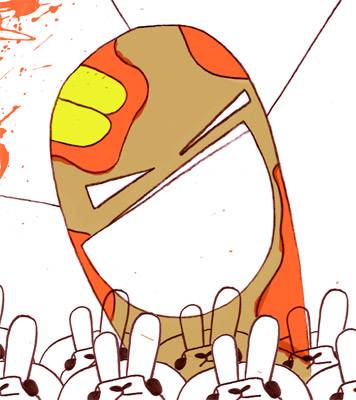Ginger the Carrot

Ginger the Carrot
-Ginger the Carrot' is the first volume in the series of picture books for adults entitled -Rotten Veggies'. More than just a book"it is also a work of art.
Published by -Un Café L'edition', -Ginger the Carrot' tells the story of a young carrot picked on by the rest of his kind for the colour of his skin. One day he's had it up to his sprouts, and leaves (no pun intended), setting out to discover the big wide world"think: sex, drugs and alcohol.
The author, Zam Steepa (aka Nathan Gross) left home himself as a young carrot. He is an Australian now transplanted in the south of France. His own experiences influenced the story but he says he also looked back to his childhood for inspiration in writing Ginger:
'My parents were always saying, -Eat your Veggies son! They're good for you!" Their words appear to have left an impression, although perhaps not the one intended.
Ginger is one twisted take on your average coming-of-age-story.
Sally Dee's illustrations are naïve and simplistic, even child-like, yet they mix as perfectly as carrot and ginger in soup with a story that is at times brusque, innocent, unforgiving in it's choice of language, and always brutally honest.
The presentation of the book turns -Ginger' into an objet d'art. Smallish at 17x13cm, portrait orientated in size, it is offset printed on a thick grain of a paper so the ink is absorbed and dispersed like it would appear upon a canvas. The difference with this canvas is, you can pick it up and touch it, then explore the art in another dimension by reading the story.
As for the health benefits of this very -rotten veggie'? They say a good laugh is a remedy for whatever ails you and -Ginger the Carrot' provides plenty of medicine.
Ginger the Carrot
Un Café L'edition
Author: Zam Steepa (aka Nathan Gross)
Illustrator: Sally Dee
-Ginger the Carrot' is available now for pre-order in Australia at www.rottenveggies.com
RRP: $25.00
Interview with Nathan Gross
Question: Can you tell us about the Rotten Veggies series?
Nathan Gross: Rotten Veggies is a series of picture books for adults, consisting of four volumes, the first being Ginger the Carrot. Each story portrays different elements of the darker side of human behaviour through the characters who are vegetables. For instance, Ginger's is a coming of age story, a story about a young carrot picked on by the rest of the carrots in the garden for the colour of his skin. He leaves his patch to discover the big wide world, and of course, as all young people do, experiments with alcohol, drugs and sex, on the way to taking control of his own destiny.
The rest of the series sees veggies portraying druggies and drug lords, dealers and baggie-packers, becoming monsters hellbent on vengeance, and as liars and jealous murderers. You know, all the rotten traits us humans are capable of possessing.
Rotten Veggies is also more than just a series of books. Each book is also an objet d'art (art object). The books are printed on a thick grain of a paper, and enveloped in an even thicker double-folded cover. The ink is absorbed and dispersed across the pages in the same way as ink would appear upon an artist's canvas. The difference being that Ginger the Carrot is a canvas you can pick up and touch, then explore as art in another dimension by reading the story.
Question: What inspired the concept of a series of picture book for adults?
Nathan Gross: It wasn't initially the intention to create picture books for adults. In fact the idea for Rotten Veggies started when Sally Dee was showing me some illustrations of hers one day, hoping some of them would inspire me to come up with a kid's story. She showed me a picture of these cute little smiley vegetables. I think they were her favourites. I took one look at them and gave her a clear "No!" " they didn't inspire me at all! But then a couple of nights later I found myself thinking about them and how it could be interesting if these young veggies were subjected to the 'real world', and how they'd react to such new experiences. What followed was Ginger the Carrot, which was written in a naive voice, but with a 'no holds barred' attitude to the use of language and 'adult' themes.
Once Sally Dee got a hold of Ginger, she sensed the story being more for adults than for kids, but held on to the spirit of an illustrated book. She went away and drew, then fully constructed a model of the book, which was basically the same final format we have kept today for the final product! It was at this point that we realised we had a book, an object, that was most definitely a picture book but for an adult audience.
Question: How much of your inspiration comes from real life and real people?
Nathan Gross: A majority of my inspiration in my writing comes from reality. In some ways I see the words I put to paper as my interpretation of the world around me, of the world as it appears to me. For Rotten Veggies, I imagined different scenarios and asked myself how a real person would react to that situation. Then I chose the vegetable I felt would best portray each situation. Perhaps I was inspired even more so by reality for my upcoming novel The Freeing of Jonathon Mark, much of which was written whilst living in France. I would take a minute section of a piece of life as I saw it unfold in front of me, without the full knowledge of what was being spoken in French, and would create a character for my book based on what I imagined to have been taking place, or what the back-story of that situation could be.
Other times what I write comes from my own experiences, which is also partly the case for Ginger the Carrot. I think that's probably a normal process for a writer, although it's often only when reading back to myself what I've written that I realise how much of my own experience has made its way out of me and into my story.
Question: Why was it important for you to publish the book in both English and French?
Nathan Gross: The idea was originally just to print it in English, it's original version. But our editors Un Cafe L'edition ! who are based in France really liked the story and thought it would appeal to French readers too. So we had it professionally translated, and then adapted to match the ambience of the original version"which was a really hard experience! Australian slang doesn't translate directly into French! But it was worth it. The book now exists in two languages and this run consists of 300 copies in English and 300 copies in French.
It also meant that being based in France; we could make contact with a much larger public than if it was just printed in English. And it was a good move! The French public has really taken to this book, the feel of the paper, the idea that it is an object as well as a book, and the uniqueness of the story.
Question: Do you make your children eat their veggies?
Nathan Gross: We try to! My wife and I really push the idea of the health benefits of veggies. Our daughter takes to them more than our son. The problem is, now whenever I drop the line "Eat your veggies, they're good for you!", they just laugh and quote straight from Rotten Veggies: "Not these veggies Dad! They're rotten to the core!" I think I need to find a new approach...
Question: How do Sally Dee's illustrations complement the story?
Nathan Gross: I'd say they complement the story perfectly. The story is brusque, unforgiving in it's use of coarse language, and full of adult themes. The illustrations are naive, childlike even in their appearance but they are most definitely for an adult, or mid-late teenage reader in their detail. The two elements, the writing and the illustrations kind of come at each other from two opposite spectrums and explode in a way that can only be described as Ginger the Carrot.
Question: Can you tell us about the second book in the series, Randy the Runner?
Nathan Gross: Phew! Randy! Well, the story is already written and is awaiting illustrations. Randy is a runner bean who is hot-tempered, ambitious and a little (Steve) Buscemi. Runner beans have a reputation of being kind, and nice, but Randy dreams of being bad-ass. So he takes a job as a drug runner, keeping all creeds of root vegetables high on their favourite fix. But that's not -bad-ass' enough for him. The 'bad-ass' he wants to be is like his boss, Bertie the Beetroot. Bertie is big, bad, and a little Marsellus Wallace. Randy resolves to become a -bad-ass' drug lord, even if it means taking Bertie down to achieve it.
Interview by Brooke Hunter
MORE





